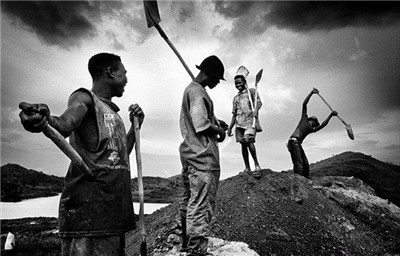China’s move to reform its state-owned enterprises has seen more than $50bn of assets change hands in just two deals that make clear the potential scale of a transformation of the sprawling sector.
在中国改革国有企业的过程中,仅两宗交易中就转让了高达500亿美元的资产。这两宗交易让人们认识到,这个庞大部门的改革可能达到什么规模。
The two deals are the vanguard of what the region’s investment bankers hope will be a steady stream of work in the coming years as Beijing pushes forward with reforms intended to streamline lumbering SOEs and boost economic efficiency. What is less certain, however, is how profitable it will be for the dealmakers.
这两宗交易起到了为大量类似交易投石问路的作用。随着中国政府不断推行意在提高国企效率、提高经济效益的改革措施,亚洲投行人士希望今后几年类似交易将为他们带来源源不断的生意。但交易促成者能从中获得多少利润,目前还不那么确定。

Sinopec this week agreed to sell a $17.4bn stake in its retail unit to a group of 25 mostly domestic investors. Just last month, Citic Group injected $37bn of assets into a Hong Kong-listed unit, transforming an ailing $6bn subsidiary into a $44bn financial conglomerate overnight.
本周,中石化(Sinopec)同意将174亿美元的零售部门股份出售给一个由25个投资方组成的团体。这25家投资方主要由民企组成。就在上个月,中信集团(Citic Group)向其在香港上市的子公司注入了370亿美元资产,一夜之间将一个问题缠身的市值60亿美元的子公司变成了一个市值440亿美元的金融集团。
“Will reform keep banks busy? For sure. Will it produce a rush of fees? That’s less clear,” says one senior equity banker.
一位资深股权银行家表示:“中国的改革会让银行业务增多么?当然会。会为银行带来更多佣金么?这就没那么明显了。”
The size of the investment banking fee pool in Asia has tended to lag banker hopes even as the region’s fast-growing emerging markets, including China, have tempted dealmakers east.
在亚洲,尽管包括中国在内的新兴市场因成长迅速,使得许多交易商东来,但投行业务佣金总规模却往往落后于银行家的期望。
Even when Asian investment banking revenue reached record levels in 2010 and 2011 as Chinese mega-listings made Hong Kong the world’s biggest IPO market, Asia accounted for, at best, 17 per cent of the global fee pool, according to Dealogic. On average over the past decade, it has produced 12 per cent of the pie.
2010年和2011年,中国大量上市活动曾令香港变成全球最大首次公开招股(IPO)市场,当时亚洲投行业务营收曾达到创纪录水平。根据Dealogic的数据,即使在当时,亚洲佣金总规模占全球佣金总额的比例最多也只有17%。过去10年来,亚洲所占份额平均只有12%。
Citic and Sinopec offer two different approaches to reform. The first was in effect a reverse listing, while Sinopec was a partial spin-off. Bankers expect these will roughly bookend the formats adopted.
中信和中石化提供了两种不同的国企改革方式。前者其实是一种反向上市,而中石化则是一种部分分拆操作。银行业人士预计,这两种操作大致包括了准许采用的改制模式。
“There are some SOEs with listed subsidiaries and then there are those where the main entity is already listed, but with subsidiaries that may offer untapped value,” says Mille Cheng, co-head of Asia Pacific equity capital markets at Morgan Stanley, who expects that the process will take a while to evolve. “A lot of them are now exploring what they might want to do.”
摩根士丹利(Morgan Stanley)亚太股权资本市场部门共同主管Mille Cheng表示:“部分国企的情况是子公司已经上市,部分国企是母公司已经上市。不过,子公司上市的情况下,改制可能会有利可图。”目前,Mille Cheng预计国企的改制过程需要过一阵才会发展起来。“许多国企都在探索他们想要怎么做。”
Fees for the Sinopec deal are still being finalised. The oil major was advised by Bank of America Merrill Lynch, CICC, Citic Securities and Deutsche Bank.
中石化交易的佣金仍未最终敲定。为这家石油巨头提供咨询服务的包括美银美林(Bank of America Merrill Lynch)、中金公司(CICC)、中信证券(Citic Securities)以及德意志银行(Deutsche Bank)。
None of the four would comment on the deal. However, China’s SOEs are known for using their size and importance to push back hard on fees. Banks will also typically accept lower fees on deals like this in the hope they will win a leading place on any IPO – as expected will happen in the Sinopec deal – down the line.
这四家银行都不愿置评这一交易。不过,众所周知中国国有企业很善于利用它们的规模及重要地位,大力压低佣金规模。而对于这样的交易,银行往往也会接受较低的佣金,希望能在所有IPO过程中都赢得领导地位。中石化的交易中预计也会出现这种局面。
Said one person involved in the Sinopec deal: “To be honest, the more important thing is the eventual listing. I think all the banks see it as about that.”
一位参与中石化交易的人士表示:“实话说,更重要的是公司最终的上市。我觉得所有银行看待这个问题都是这样想的。”
Listing fees in Hong Kong vary. Banks may earn perhaps 3 per cent of the amount raised on smaller, private companies but something nearer 2 per cent on bigger deals. New York fees, by contrast, are much higher, at more than 5 per cent on most deals – and there are usually fewer banks splitting the fee pool.
在香港,上市佣金因事制宜。规模较小的民企上市过程中,银行可能会收取募得资金的3%,而对于较大规模的交易,这一比例大约为2%左右。相比之下,纽约的佣金要高多了,多数交易中的佣金比例都在5%以上,而且分享佣金池的银行通常也要少一些。
In Asia, however, listings have an outsized importance to the overall investment banking fee pool, meaning they are worth chasing. About 40 per cent of the industry’s fees come from listings, compared with an average of a quarter globally.
然而,在亚洲,上市业务在投行业务总佣金中占有极大分量,也就是说亚洲投行对上市业务的偏好是有原因的。该行业40%的佣金来自上市业务,相比之下全球这一比例只有四分之一。
Some bankers, however, caution against assuming the spin-off and list pattern would hold true this time round.
不过,部分银行家警告说,不要想当然的认为这次的分拆上市模式能推而广之。
“The ultimate goal is not listing in itself. The government wants these companies to be more mature in how they operate and to have a major presence in international financial markets. This will happen in many different ways,” says Eugene Qian, head of China banking at Citi.
花旗(Citi)中国银行业务主管钱于君(Eugene Qian)表示:“最终目标不是上市本身。中国政府希望这些企业能够在运营方面更加成熟,并希望他们能够全面走向国际金融市场。许多不同途径都可以实现这一目标。”
If a steady stream of IPOs fails to materialise, that poses a risk for bankers’ fee hopes.
如果源源不断的IPO无法实现,投行人士对佣金的期望就可能落空。
Only Citic Securities and Morgan Stanley got official credit for Citic’s deal and other largely internal restructurings are likely to produce similarly limited work. Unless, of course, investment bankers manage to persuade SOEs that divestments or spin-offs should be part of those deals, too.
只有中信证券和摩根士丹利在中信的交易中得到了中国官方的认可,而其他在很大程度上算内部重组的交易很可能也不会带来太多业务。当然,除非投行人士能成功令国有企业相信,资产剥离及分拆也应该被算作此类交易的一部分。













